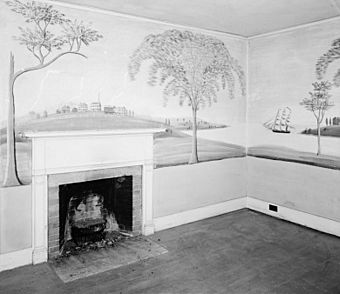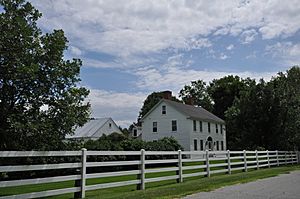Moses Kent House facts for kids
Quick facts for kids |
|
|
Moses Kent House
|
|

Mural by Rufus Porter in the house, 1959 photograph
|
|
| Location | River Rd., Lyme, New Hampshire |
|---|---|
| Built | 1811 |
| Architectural style | Federal |
| NRHP reference No. | 84002808 |
| Added to NRHP | June 7, 1984 |
The Moses Kent House is a historic home located in Lyme, New Hampshire. It was built in 1811 and is a great example of the Federal period style of architecture. This house is especially famous for the beautiful paintings, called murals, on its inside walls. These murals were created by a traveling artist named Rufus Porter. Because of its historical importance, the Moses Kent House was added to the National Register of Historic Places in 1984.
Contents
Exploring the Moses Kent House
The Moses Kent House is found in a quiet, countryside area near the border of Lyme and Orford. It's a two-and-a-half-story house made of wood. It has a pointed roof and two chimneys inside. The outside is covered with horizontal wooden boards called clapboards.
What Does It Look Like?
The front of the house is very balanced and neat. It has five sections across and two sections deep. The main door is in the center and has a fancy design around it. This design includes narrow columns and windows on the sides of the door. Above the door is a half-circle fan shape, which is typical of the Federal style.
Inside the House: Amazing Murals
Inside, the house has a central hallway with two rooms on each side. The hallway itself is split into a front and back part on the ground floor. Some of the walls in the hallway, the living room (called a parlor), and a bedroom upstairs have special plaster walls with murals painted on them.
These murals show scenes of the countryside and views of harbors. These types of pictures were very common in the work of Rufus Porter. They give you a peek into what people imagined and valued long ago.
History of the Moses Kent House
Moses Kent built this house in 1811. Since then, the house hasn't changed much structurally. The biggest change was adding a garage in 1952.
Over the years, the house has been used in different ways. It has been a rental home, a summer vacation spot, and even a farmhouse. In the 1980s, experts who knew a lot about Rufus Porter's artwork carefully restored the inside of the house. Today, the house is protected by a special agreement called a historic preservation easement. This helps make sure it stays preserved for many years to come.




